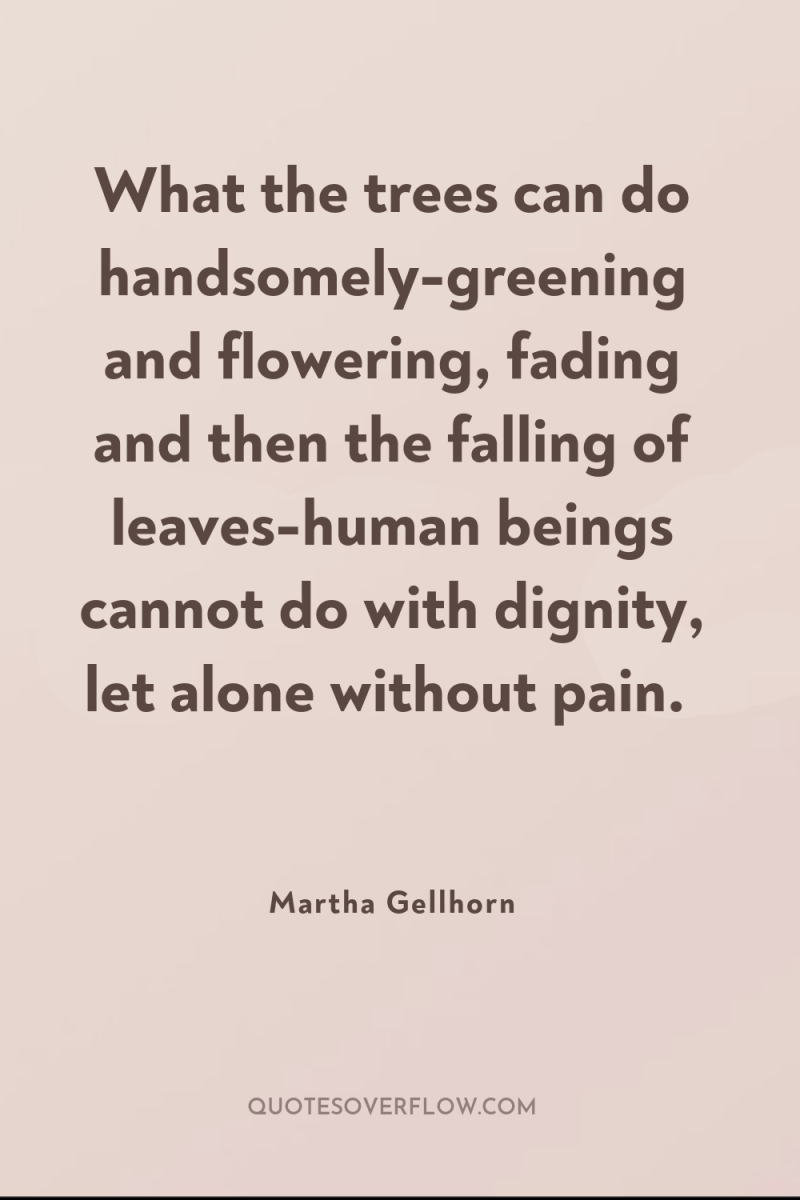
I know enough to know that no woman should ever marry a man who hated his mother.Martha Gellhorn
It is high time that I learn to be more careful about hope, a reckless emotion for travelers. The sensible approach would be to the expect the worst, the very worst, that way you avoid grievous disappointment and who knows with a tiny bit of luck, you might even have a moderately pleasant surprise, like the difference between hell and purgatory.Martha Gellhorn

What the trees can do handsomely-greening and flowering, fading and then the falling of leaves-human beings cannot do with dignity, let alone without pain.Martha Gellhorn
No wars, in the war-logged record of our species, have been terminal. Until now, when we know that nuclear war would be the death of our planet. It is beyond belief that any governments—those brief political figures—arrogate to themselves the right to stop history, at their discretion.Martha Gellhorn
I do not hope for a world at peace, all of it, all the time. I do not believe in the perfectibility of man, which is what would be required for world peace; I only believe in the human race. I believe the human race must continue.Martha Gellhorn

On the night of New Year’s Day, I thought of a wonderful New Year’s resolution for the men who run the world: get to know the people who only live in it.Martha Gellhorn
I had a sudden notion of why history is such a mess: humans do not live long enough. We only learn from experience and have no time to use it in a continuous and sensible way.Martha Gellhorn
The only way I can pay back for what fate and society have handed me is to try, in minor totally useless ways, to make an angry sound against injustice.Martha Gellhorn
I took only one suitcase, and a cosmetics case for medicines but I was worried about books. Solitude is all right with books, awful without.Martha Gellhorn
... none had been outside Russia. I kept trying to remember something that I had read about a species of fish that was born, lived, spawned, died in the dark waters of a cave; and were blind.Martha Gellhorn
Our hearts are light and gay because now its happening, we're starting, we're travelling again.Martha Gellhorn
I tell you loneliness is the thing to master. Courage and fear, love, death are only parts of it and can easily be ruled afterwards. If I make myself master my own loneliness there will be peace or safety: and perhaps these are the same.Martha Gellhorn
Nothing is better for self-esteem than survival.Martha Gellhorn
In Warsaw, you also remember that you are in a Communist-controlled country, though by all accounts the control is now humane and lenient, judged by what it was and what it is in other satellite countries. Still you do hear the incompetent echo in the tapped hotel telephone, you do notice that people look over their shoulders when talking in restaurants - the secret police are dormant but not forgotten; you feel in your bones, as you would a threatening change in the weather, every change in Russian mood or action. This is not and air we have ever breathed; I doubt if we would be strong enough to resist such a climate and stay as healthy in spirit as the Poles.Martha Gellhorn
A broken heart is such a shabby thing, like poverty and failure and the incurable diseases which are also deforming. I hate it and am ashamed of it, and I must somehow repair this heart and put it back into its normal condition, as a tough somewhat scarred but operating organ.Martha Gellhorn
Politics really must be a rotten profession considering what awful moral cowards most politicians become as soon as they get the job.Martha Gellhorn
Then somebody suggested I should write about the war, and I said I didn't know anything about the war. I did not understand anything about it. I didn't see how I could write it.Martha Gellhorn
Why do people talk of the horrors of old age? It's great. I feel like a fine old car with the parts gradually wearing out, but I'm not complaining, ... Those who find growing old terrible are people who haven't done what they wanted with their lives.Martha Gellhorn
After the desperate years of their own war, after six years of repression inside Spain and six years of horror in exile, these people remain intact in spirit. They are armed with a transcendent faith; they have never won, and yet they have never accepted defeat.Martha Gellhorn
It would be a bitter cosmic joke if we destroy ourselves due to atrophy of the imagination.Martha Gellhorn